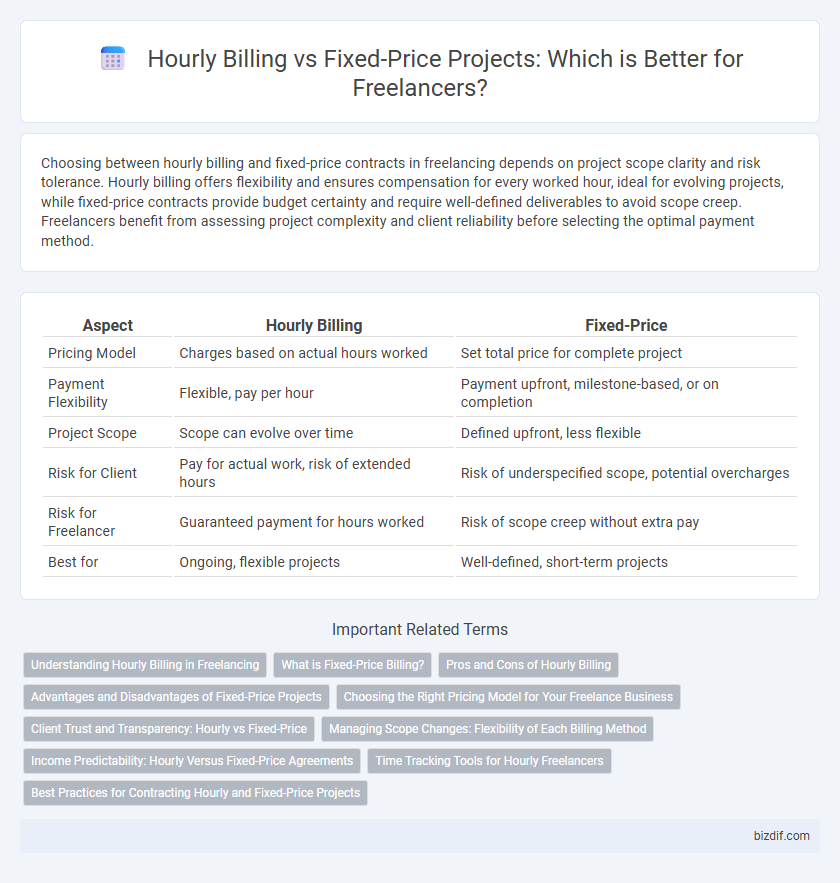Choosing between hourly billing and fixed-price contracts in freelancing depends on project scope clarity and risk tolerance. Hourly billing offers flexibility and ensures compensation for every worked hour, ideal for evolving projects, while fixed-price contracts provide budget certainty and require well-defined deliverables to avoid scope creep. Freelancers benefit from assessing project complexity and client reliability before selecting the optimal payment method.
Table of Comparison
| Aspect | Hourly Billing | Fixed-Price |
|---|---|---|
| Pricing Model | Charges based on actual hours worked | Set total price for complete project |
| Payment Flexibility | Flexible, pay per hour | Payment upfront, milestone-based, or on completion |
| Project Scope | Scope can evolve over time | Defined upfront, less flexible |
| Risk for Client | Pay for actual work, risk of extended hours | Risk of underspecified scope, potential overcharges |
| Risk for Freelancer | Guaranteed payment for hours worked | Risk of scope creep without extra pay |
| Best for | Ongoing, flexible projects | Well-defined, short-term projects |
Understanding Hourly Billing in Freelancing
Hourly billing in freelancing involves charging clients based on the actual time spent working on a project, typically recorded through time-tracking tools like Toggl or Harvest. This model provides transparency and flexibility for both freelancers and clients, allowing adjustments in scope and workload without renegotiating the contract. It is especially beneficial for projects with uncertain requirements or ongoing tasks where precise deliverables are difficult to define upfront.
What is Fixed-Price Billing?
Fixed-price billing is a project payment method where freelancers and clients agree on a set amount for the entire job, regardless of the hours worked. This approach allows for clear budget expectations and reduces the risk of scope creep during freelance projects. It is particularly suitable for well-defined tasks with specific deliverables and timelines.
Pros and Cons of Hourly Billing
Hourly billing offers flexibility for projects with unclear scopes, allowing freelancers to adjust work hours based on evolving client needs and project complexity. However, it may lead to uncertain income streams and potential disputes over time tracking accuracy, requiring transparent communication and reliable tools for time management. This model benefits freelancers handling ongoing or adaptable tasks but can be challenging for clients seeking fixed budgets.
Advantages and Disadvantages of Fixed-Price Projects
Fixed-price projects offer clear budget expectations and scope control, making it easier for clients and freelancers to manage costs and deadlines effectively. However, fixed-price contracts can limit flexibility, as changes in project requirements may lead to disputes or the need for renegotiation, potentially impacting project timeline and profitability. Freelancers must carefully estimate time and resources upfront to avoid underpayment or overruns, balancing risk between parties.
Choosing the Right Pricing Model for Your Freelance Business
Choosing the right pricing model for your freelance business depends on project scope, client preferences, and your workflow efficiency. Hourly billing suits projects with flexible or evolving requirements by ensuring compensation for actual time spent, while fixed-price contracts benefit clearly defined projects with set deliverables, offering clients budget predictability. Assessing project complexity, risk factors, and communication clarity helps freelancers maximize earnings and client satisfaction through tailored pricing strategies.
Client Trust and Transparency: Hourly vs Fixed-Price
Hourly billing enhances client trust by offering transparent tracking of work hours and detailed progress updates, ensuring clients see exactly where their investment goes. Fixed-price projects provide upfront clarity on costs, reducing budget surprises but require clear scope definition to maintain transparency and avoid disputes. Balancing these methods depends on project complexity and the client's preference for flexibility versus predictability in payment.
Managing Scope Changes: Flexibility of Each Billing Method
Hourly billing offers greater flexibility for managing scope changes by allowing adjustments in project hours without renegotiating contracts, accommodating evolving client needs. Fixed-price contracts require precise initial scope definitions, making scope changes more challenging and often necessitating formal change orders or contract amendments. Freelancers leveraging hourly billing can efficiently handle dynamic project requirements, while fixed-price arrangements demand careful scope management to avoid disputes and maintain profitability.
Income Predictability: Hourly Versus Fixed-Price Agreements
Hourly billing offers freelancers consistent income based on tracked work hours, enhancing predictability through regular invoices and payments. Fixed-price agreements provide guaranteed payment for completed projects but carry risks of scope creep and variable project timelines, potentially affecting cash flow. Choosing between these models depends on the freelancer's need for steady revenue versus flexibility in project scope and deadlines.
Time Tracking Tools for Hourly Freelancers
Time tracking tools like Toggl, Harvest, and Clockify enhance accuracy and transparency for hourly freelancers by recording billable hours and project progress. These platforms integrate with invoicing systems, ensuring precise billing and reducing disputes with clients. Reliable time tracking is essential to maximize earnings and maintain trust in hourly billing arrangements.
Best Practices for Contracting Hourly and Fixed-Price Projects
Establishing clear scope and deliverables is essential for fixed-price projects to minimize scope creep and ensure timely completion. For hourly billing, accurate time tracking using tools like Toggl or Harvest helps maintain transparency and trust between client and freelancer. Combining detailed contracts with regular communication supports smooth project management and reduces payment disputes.
Hourly billing vs Fixed-price Infographic

 bizdif.com
bizdif.com